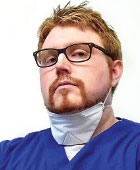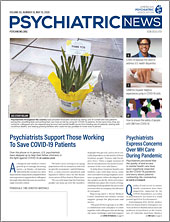As a psychiatry intern at Montefiore Medical Center, I finished my internal medicine rotations in December. For three months this year, I rotated on an adult inpatient psychiatric unit. During March, the spread of COVID-19 throughout New York City resulted in several sequential changes to the unit, including a system whereby half of the interns would work from home to maintain social distancing. Daily activities on the unit, including therapy groups, became progressively more restrictive as COVID concerns grew.
On Sunday, March 29, my intern class had an emergency Zoom meeting during which we learned that deployment to COVID floors was imminent for all of us, part of a coordinated institutional effort to handle the COVID surge. Just three days later, I was notified of my deployment to an inpatient medicine unit. While I was among the first psychiatry residents to be deployed, many others have joined me at different times and locations (including all able PGY-1 and PGY-2 trainees). As of the last week in April, all inpatient units at Montefiore were equipped to manage all or mostly all COVID-positive patients. Even the inpatient psychiatry unit, which remained COVID-free until recently, now has several COVID-positive patients with psychiatric disorders. Montefiore also strategically created several temporary units using a variety of spaces, such as lecture halls and outpatient clinics.
Deployed psychiatry residents are considered “allied” specialists, meaning we are always partnered with internal medicine residents. We are also strictly assigned to inpatient medical floors, not to emergency departments or intensive care units. Shifts for most of us are 12 hours (7 a.m. to 7 p.m.) and arranged in alternating blocks of seven days “on” and seven days “off” (including possible “jeopardy” days when we may be called in to relieve sick colleagues).
There is a substantial amount of fear and anxiety involved in COVID work. However, in many ways my deployment experience has been relatively straightforward. My assigned unit is small, and my team has consistently covered fewer than 10 patients, so I typically carry only three to five patients at a time. I feel very fortunate in this regard because fewer patients mean limited exposure. Some of my colleagues deployed elsewhere are carrying more patients and sicker patients.
“Pre-rounding” is done exclusively via chart review, so the first bedside encounter for each patient is usually during attending rounds. Later in the day, we avoid reentering rooms unless a patient requires urgent bedside assessment, perhaps due to a declining oxygen saturation level (the most common reason for reentering a room). Sometimes we can monitor patients from the hallway, thanks to newly installed windows on each door. There is also a constant effort to minimize exposure for other team members. For instance, blood draws are typically limited to once daily, and timing of medication is adjusted to minimize the frequency of nurses having to enter the room.
Other medical specialists can often perform consultations remotely, assessing the patient based on chart review before providing recommendations. Overall, this approach to inpatient care minimizes exposure risks for everyone. It also creates more reliance on the medical chart. At times, it feels as though we are working remotely from the proximity of the nursing station.
Visitors are typically forbidden, so it is crucial to call families on a daily basis. Fortunately, my training in psychiatry has already been a boon to my phone communication skills. Our psychiatry department also distributed several scripts to help navigate difficult conversations. Personally, I feel extremely fortunate in that I have not needed to have the most difficult conversation with any family member. Despite the disturbing volume of patients who are very sick, there is a larger volume of patients who rebound, sometimes dramatically, with the help of inpatient medical support.
Because of a possible exposure during my last week on psychiatry, I underwent mandatory COVID testing after my third deployment shift. The test was negative, and I continue to remain asymptomatic. This is an encouraging sign that my personal protective equipment (PPE) has been effective. Throughout each day, I wear both N95 and surgical masks (provided daily in the hospital lobby). Whenever I enter patient rooms, I also wear a face shield, two gowns, and two pairs of gloves. Importantly, I sanitize and/or wash my hands obsessively throughout the day.
A recurring theme of the pandemic continues to be the omnipresent uncertainty about how everything will unfold. Uncertainty regarding individualized medical decisions poses frequent challenges during deployment. Team-based support has been especially helpful when facing these challenges. My team seemed to develop a sense of mutual respect and camaraderie almost instantaneously. We have also been fortunate to have downtime during most afternoons, making it easier to provide personal support to each other. Meanwhile, we try to expand our understanding of COVID together by looking over new data and sharing resources. Montefiore’s institutional policies for COVID management, which are updated daily, have also illuminated a few “high-yield” knowledge gaps to review. Overall, I feel prepared by my ongoing medical education.
•
In closing, I want to emphasize the following to psychiatry colleagues elsewhere:
•
Consistent and vigilant use of PPE helps prevent exposure to the virus. There has been an adequate supply of PPE at Montefiore throughout April.
•
The fear and anxiety, in my opinion, are not only to be expected, they also serve as healthy motivators to be hypervigilant about handwashing and use of PPE.
Finally, my medical knowledge base after completing the medicine rotations required by the Accreditation Council for Graduate Medical Education in December has been appropriate. When coupled with ongoing learning and the invaluable support from a great team, I have been able to fulfill my deployment responsibilities. ■

